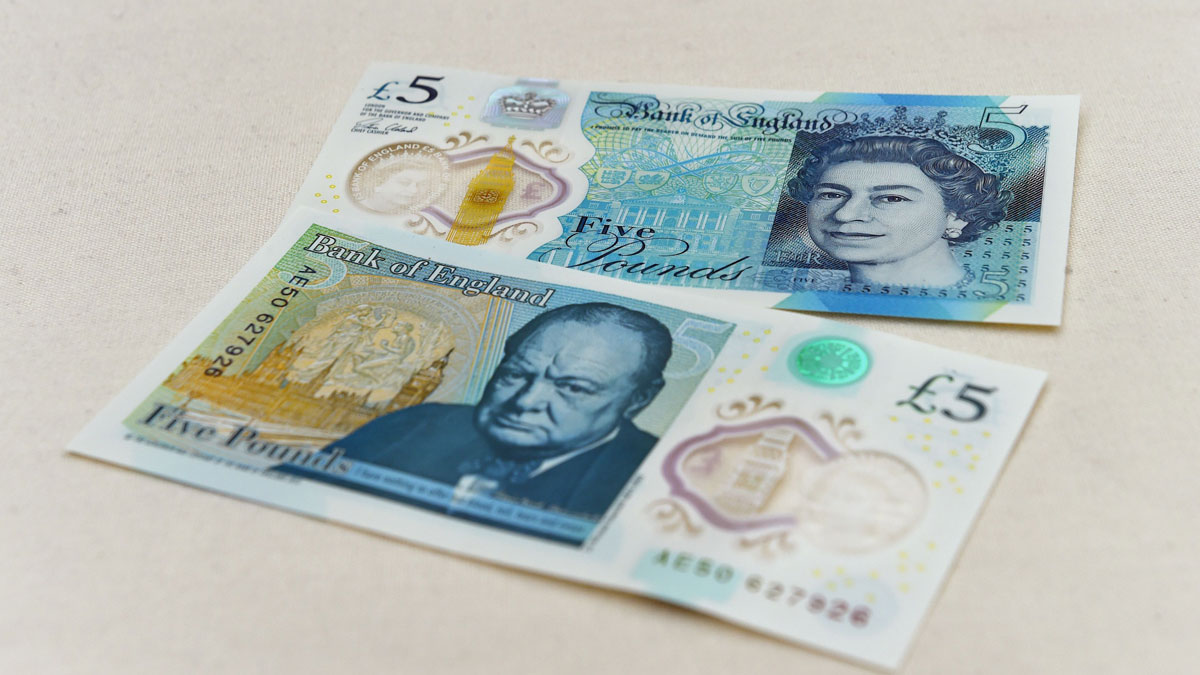New plastic £5 note: Everything you need to know
New £10 and £20 notes will follow, but there are no plans for a £50 model

A free daily email with the biggest news stories of the day – and the best features from TheWeek.com
You are now subscribed
Your newsletter sign-up was successful
More than 320 years of history came to an end this week as the Bank of England's new polymer £5 note entered circulation, replacing its paper predecessor.
But did you know that it's not the first plastic bank note to be issued in the UK, that as well as boosting security it is designed to save the Bank production costs, and that your old fivers will hold their value forever?
Here everything you need to know about the new plastic money.
The Week
Escape your echo chamber. Get the facts behind the news, plus analysis from multiple perspectives.

Sign up for The Week's Free Newsletters
From our morning news briefing to a weekly Good News Newsletter, get the best of The Week delivered directly to your inbox.
From our morning news briefing to a weekly Good News Newsletter, get the best of The Week delivered directly to your inbox.
What's so special about it?
The new fiver is the one of the first plastic bank notes to enter into UK circulation. The note is made from polymer, which is meant to be more durable than the old cotton and paper mix.
But it isn’t the first such note seen in the UK. Last year Clydesdale Bank issued two million polymer £5 notes to commemorate the 125th anniversary of the opening of the Forth Bridge.
Will they last longer?
A free daily email with the biggest news stories of the day – and the best features from TheWeek.com
Yes, much. The old notes would only last around 18 months to two years before they were no longer fit to be in circulation. Around 20,000 notes each year need to be replaced due to damage, with the majority of those torn in the wash.
The new note should last around five years, according to the Bank of England. And that makes it more economical in the longer run.
It's harder to tear, should survive a cycle in the washing machine and cope better within being repeatedly scrunched and folded in pockets, purses and wallets.
“We expect polymer notes to last at least two and a half times longer than the current generation of fivers and therefore reduce future costs of production,” says Mark Carney, governor of the Bank of England.
How else is it different?
The new £5 note is easy to spot as it is 15% smaller than its predecessor, and the colour is far brighter thanks to the new material.
The new note is also packed with new security features to make it harder to counterfeit, including a clear window showing the Queen’s portrait and Big Ben shown in gold foil on the front and silver on the back.
As well as featuring the Queen the new note has a portrait of Winston Churchill on the back.
Can I still spend my old fivers?
The old fiver, which features prison reformer Elizabeth Fry, will stop being legal tender on 5 May 2017. But don’t worry, your old fivers won’t become worthless overnight.
All bank notes issued by the Bank of England retain their face value forever. After 5 May you will need to take old notes to a bank, building society or Post Office to exchange it for a new polymer note.
If the branch refuses to exchange your note then you can swap it at the Bank of England either in person or by post.
Are other notes changing?
Britain has been quite slow to adopt polymer currency – Australia has had it since 1988 and more than 30 countries around the world have switched to plastic cash. But that is all changing now with new polymer notes arriving in coming years.
A new polymer £10 note featuring Jane Austen – to make up for the removal of Elizabeth Fry from the fiver so that there is still a woman represented on British currency – will be introduced in Summer 2017.
By 2020 there will also be a new polymer £20 note featuring artist JMW Turner.
Scottish banks are also issuing new polymer notes with a new £5 from Clydesdale Bank later this month and new plastic fivers from Royal Bank of Scotland and Bank of Scotland in October.
What about the £50 note?
At present there are no plans to replace the £50 note with a polymer version. That's because central banks are moving away from high-denomination currency that is widely used by criminals.